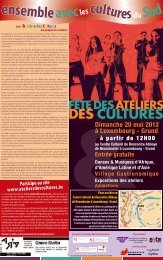Children - Terre des Hommes
Children - Terre des Hommes
Children - Terre des Hommes
Create successful ePaper yourself
Turn your PDF publications into a flip-book with our unique Google optimized e-Paper software.
112<br />
companies for their power plants, has affected agriculture in<br />
the entire block. For example, in Khamhariya villagers showed<br />
the three borewells that have no water as most of the acquifers<br />
are affected by coal extraction. The villagers expressed fear<br />
that their agricultural lands and cultivation will be further<br />
<strong>des</strong>troyed, going by their experiences since the mining started<br />
in this region. Given that malnourishment is significantly<br />
high in this region as reflected in the state reports, the critical<br />
state of water and agriculture have direct impacts on children<br />
whose food security is imminently in danger. The anger of the<br />
people is visibly evident in the agitations that are reverberating<br />
in the area, in opposition to the new projects being set up by<br />
the Jindals and others.<br />
(Acknowledgements: This case study was done in partnership<br />
with Jan Chetana Peoples Movement of Raigarh which is<br />
working on the human and environment rights violations<br />
by mining companies and industries in Chattisgarh. We<br />
acknowledge the support and assistance of Mr.Ramesh<br />
Agarwal and his team in facilitating the field visits and<br />
compilation of primary data.)<br />
Conclusions<br />
Chattisgarh, a state created in the name of the development<br />
of the adivasis, has turned into a state for indiscriminate<br />
plunder of mineral resources by mining corporates. Corporate<br />
violations and abuse on activists as well as community<br />
leaders are known to all, but it is difficult to legally hold<br />
them accountable. On the other hand, the corporates have<br />
gained notoriety for booking false cases on activists and<br />
community leaders who question this <strong>des</strong>truction and harass<br />
them ceaselessly. Poverty of the communities, pollution of<br />
the water bodies and air, encroachment of rich agricultural<br />
lands for mineral exploitation were glaringly visible but the<br />
thin lines between legitimacy and illegitimacy of activities,<br />
difficulties that communities have in surmounting legal and<br />
technical definitions of proving their health problems that<br />
relate to mining allow companies to escape and continue with<br />
rampant plunder of the land and <strong>des</strong>truction of water bodies.<br />
The shocking state of children’s education and health due to<br />
the abysmal services provided by the state compounded by<br />
ill-health due to mining induced pollution and starvation,<br />
do not reflect an economy that provi<strong>des</strong> a just and healthy<br />
development for the children living in this region. Mining has<br />
put in disarray, not only the land and livelihoods, but also the<br />
resources and services that have made achievement of MDGs<br />
for children in the mining region of Chattisgarh, a far fetched<br />
goal. Again Chattisgarh has proved that, mineral ‘rich’ states,<br />
with a prolonged history of mining, overlap with some of the<br />
poorest human development indicators in this country.






